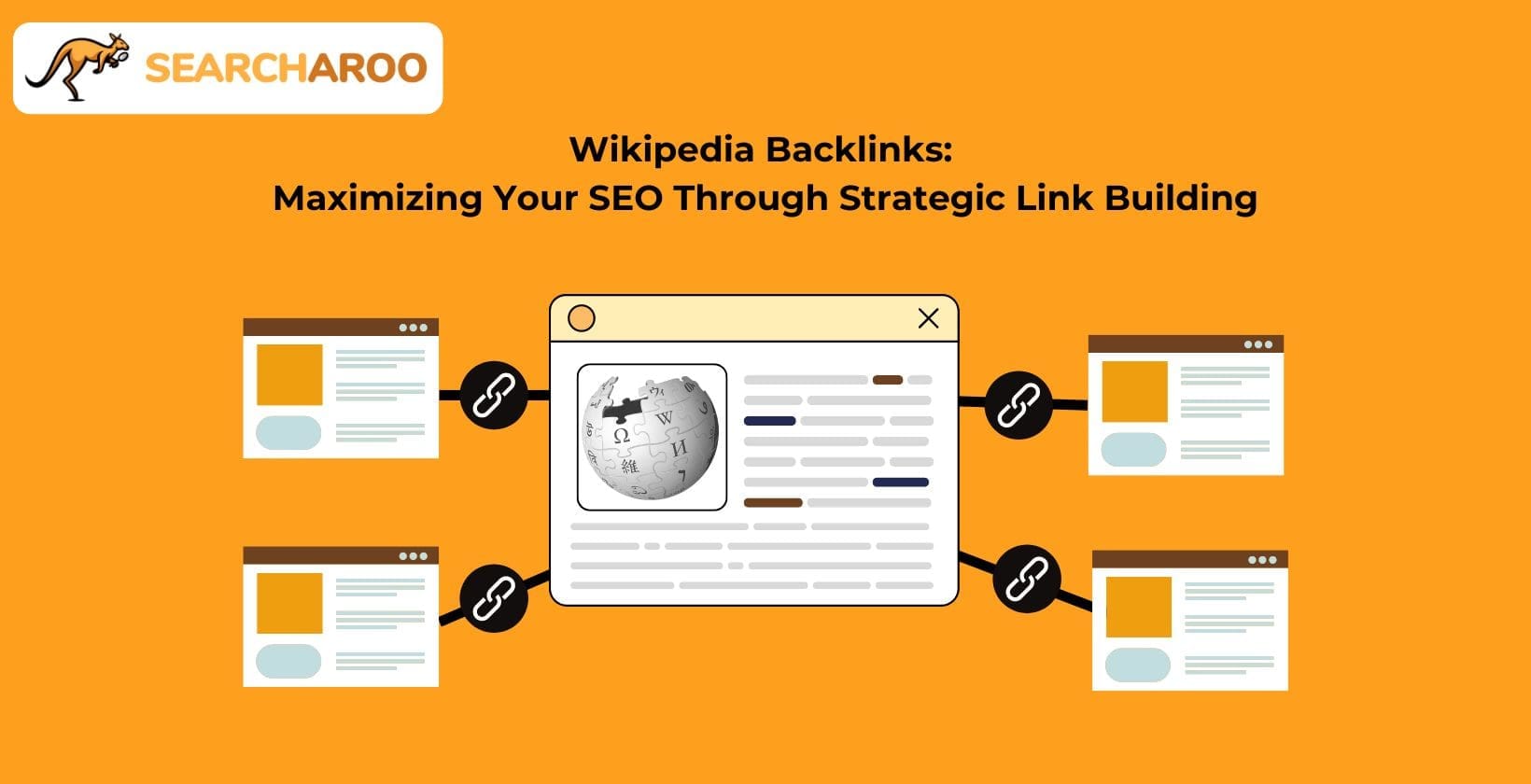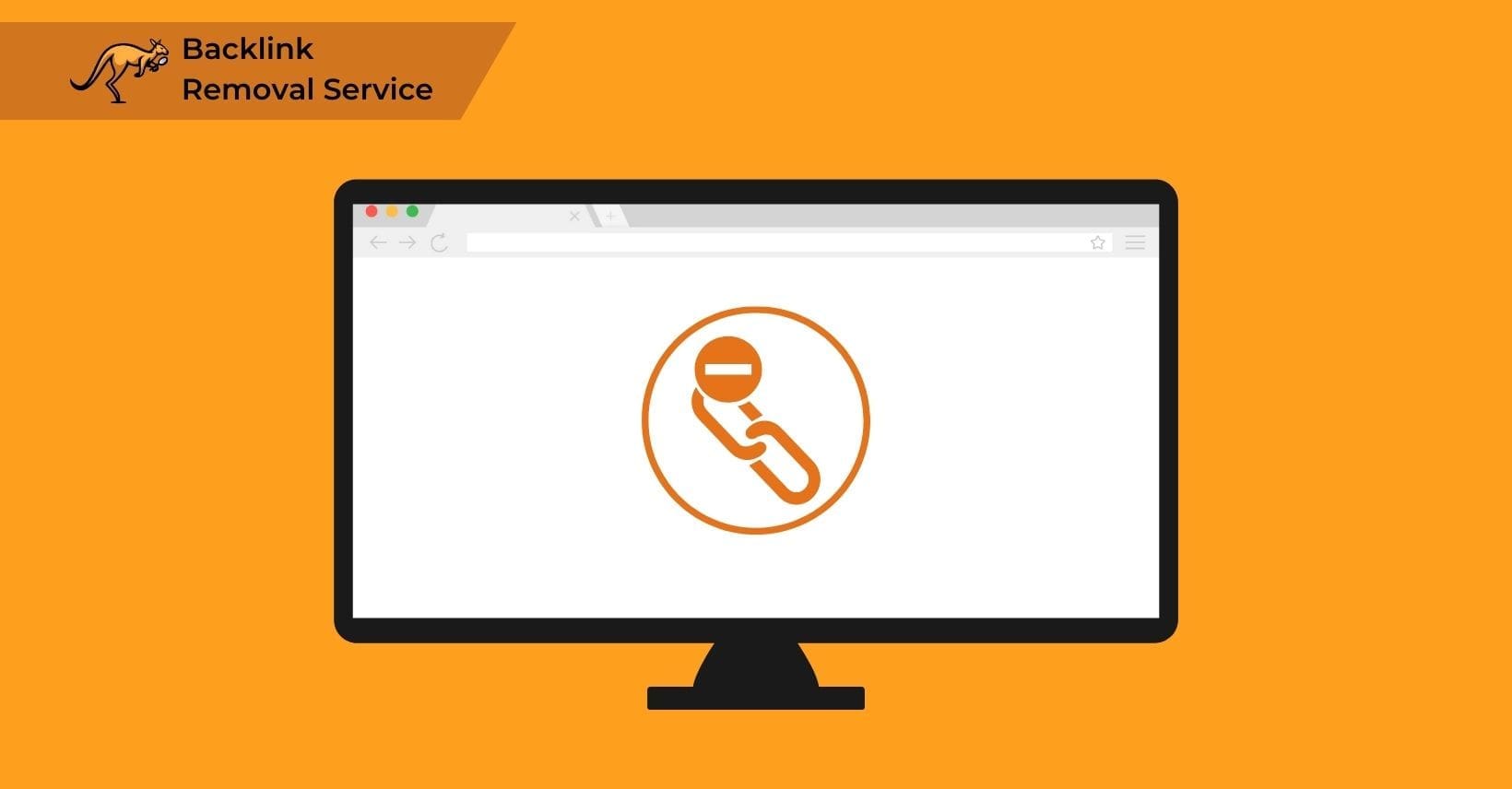Wikipedia, a major and authoritative online encyclopedia, consistently ranks among the top results in Google searches due to its extensive and multilingual content.
Despite criticisms of its editable nature, Wikipedia remains a pivotal resource for comprehensive information on different topics, from current statistics to historical data.
Wikipedia backlinks are highly valuable in SEO, enhancing a site’s visibility, authority, and search ranking. However, it is essential to contribute high-quality content, as poor contributions are flagged and removed, potentially leading to SEO penalties.
Therefore, Wikipedia backlinks represent strong and beneficial assets in SEO strategies.
Let’s explore link building and its significance in SEO.
What Is Link Building?
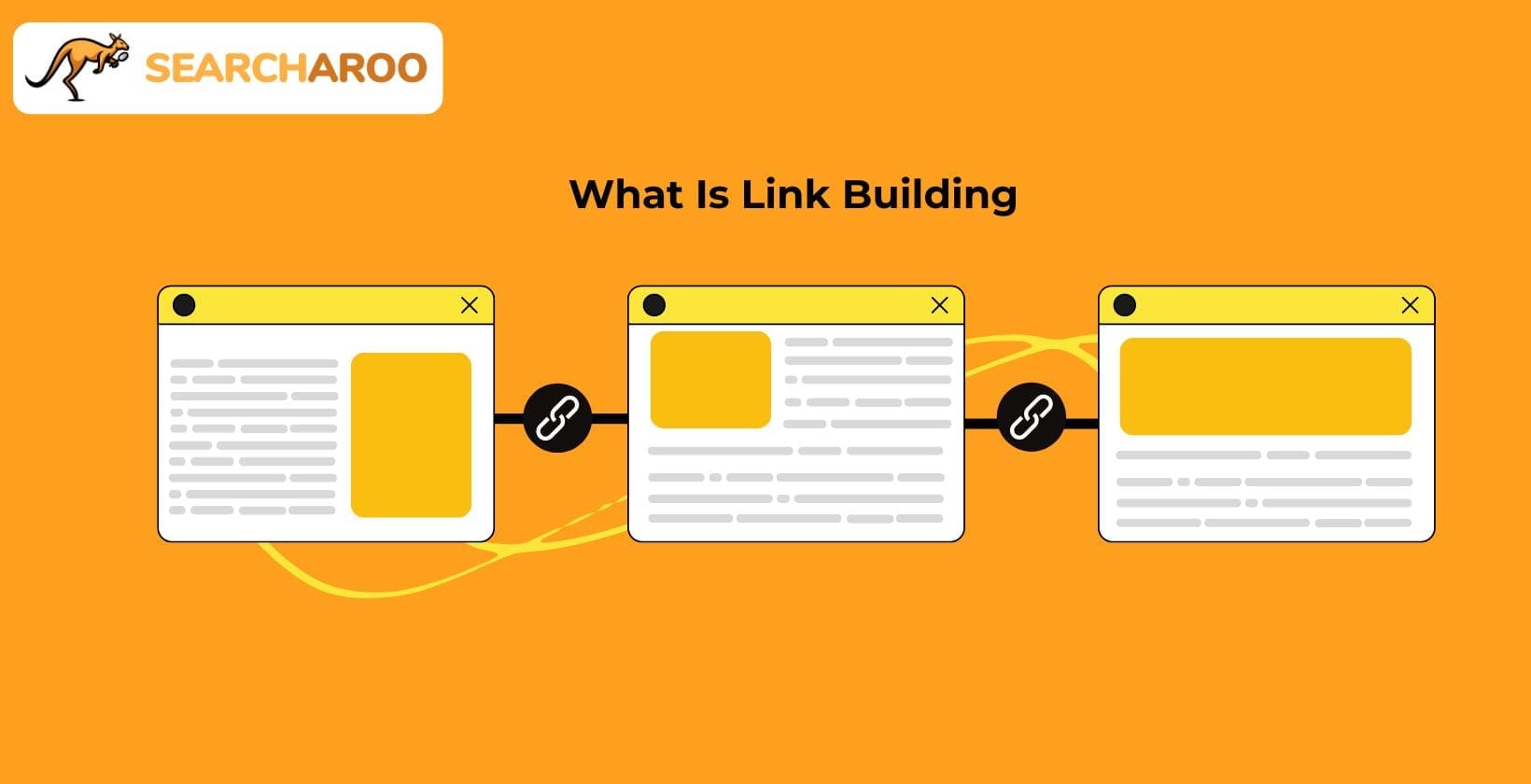
Creating high-quality material is only sometimes enough. Unless your domain has such authority that it can support itself, merely hosting content is sometimes inadequate to propel it to the first page of relevant SERPs (search engine results pages).
It is important to rank at the top of SERPs since the first Google search result for any given search receives up to 28% of the clicks for that search, while results in second and third place generally receive 15% and 11%, respectively.
It is critical to offer your material the best chance of success by getting it recognized and seen by as many people as possible.
Link building is one strategy for promoting and increasing awareness of a piece of information.
A healthy and organically discoverable piece of content requires link-building. Inbound links can generate significant referral traffic.
Referral traffic arrives on your site when a person clicks and follows a link from a page on another website to yours rather than entering the URL into their browser or using a bookmark.
When a trustworthy person adds a link from their page to your material, Google will notice this new link and boost your URL’s authority.
This critical metric is used to rank content connected to a search phrase.
What Is a Wikipedia Backlink?
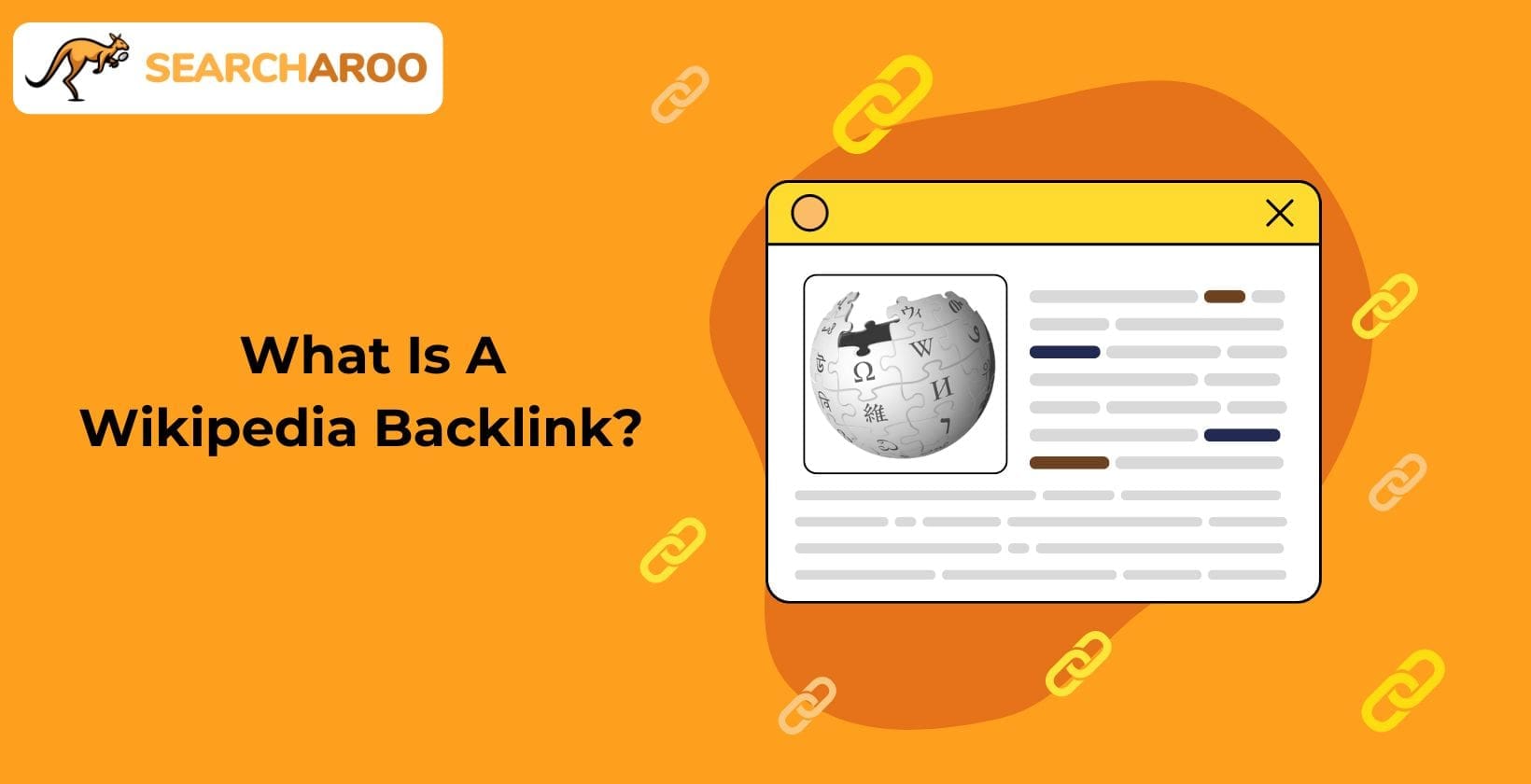
Wikipedia backlinks are hyperlinks on Wikipedia pages that connect from Wikipedia articles to external websites, found primarily in sections dedicated to external links or within citations, which serve as pathways for readers seeking additional information relevant to the Wikipedia article’s content.
As we explore the structure of Wikipedia’s linking system, one might wonder about the classification and organization of these links.
Wikipedia links can be classified into two main types:
Internal Links
These are links that point to other articles within Wikipedia itself. Internal links are an integral part of Wikipedia’s structure. They connect related topics and provide additional information to readers. They help users navigate between different articles and explore related content within the Wikipedia ecosystem.
External Links
External links are links to websites outside of Wikipedia. They are typically used as references to support information provided in Wikipedia articles. They can also be included in the “External links” section at the end of an article to provide readers with additional resources or further reading on a particular topic. However, Wikipedia has strict guidelines regarding including external links to ensure they are reliable, relevant, and verifiable sources of information.
Internal and external links are essential for providing a comprehensive and credible resource in Wikipedia articles. But why is it particularly beneficial to build links on this platform? Let’s explore how Wikipedia link-building can be a strategic asset.
Why Is Wikipedia Link Building a Good Idea?
For the majority of queries, Wikipedia appears in the search results. Wikipedia backlinks enhance your site’s SEO performance because Wikipedia is a highly authoritative site, and gaining links from Wikipedia serves as a powerful recommendation that signals credibility to search engines. Google values Wikipedia links because human moderators verify all Wikipedia content, which confirms to search engines that there is reliable human oversight over all Wikipedia articles.
Edit 3: What makes Wikipedia backlinks valuable despite being nofollow?
Original:
Wikipedia backlinks are no-follow links that do not directly pass link equity for page ranking, yet these backlinks remain valuable for SEO because Wikipedia pages contribute significantly to digital marketing efforts by driving highly relevant traffic from users actively seeking information. Despite being nofollow, Wikipedia backlinks generate indirect SEO benefits through increased visibility, brand recognition, and potential secondary linking from other sites that discover your content through Wikipedia..
Edited:
Wikipedia backlinks are no-follow links that do not directly pass link equity for page ranking, yet these backlinks remain valuable for SEO because Wikipedia pages contribute significantly to digital marketing efforts by driving highly relevant traffic from users actively seeking information. Despite being nofollow, Wikipedia backlinks generate indirect SEO benefits through increased visibility, brand recognition, and potential secondary linking from other sites that discover your content through Wikipedia.
Edit 4: How to find Wikipedia link building opportunities
Original:
Once you have decided on the right keywords, you can find Wikipedia backlink opportunities by searching for relevant Wikipedia articles where your content could add value, focusing particularly on pages that contain either opportunities for new citations or dead links that need replacement. Wikipedia pages containing hyperlinks to dead URLs that are no longer operational present ideal opportunities for link replacement, which you can discover through manual Wikipedia searches or by using specialized search operators that identify broken links within specific topic areas..
Edited:
Once you have decided on the right keywords, you can find Wikipedia backlink opportunities by searching for relevant Wikipedia articles where your content could add value, focusing particularly on pages that contain either opportunities for new citations or dead links that need replacement. Wikipedia pages containing hyperlinks to dead URLs that are no longer operational present ideal opportunities for link replacement, which you can discover through manual Wikipedia searches or by using specialized search operators that identify broken links within specific topic areas.
Edit 5: What content should you create to earn Wikipedia backlinks?
Original:
Following the identification of Wikipedia backlink opportunities, you should create content that is instructional, authoritative, and trustworthy, which demonstrates exceptional subject matter expertise while remaining factual and well-researched with proper citations. Wikipedia editors favor content that provides objective information rather than promotional material, so your pages should present verifiable facts, statistics, research findings, or comprehensive analyses that genuinely enhance the Wikipedia article’s value to readers..
Edited:
Following the identification of Wikipedia backlink opportunities, you should create content that is instructional, authoritative, and trustworthy, which demonstrates exceptional subject matter expertise while remaining factual and well-researched with proper citations. Wikipedia editors favor content that provides objective information rather than promotional material, so your pages should present verifiable facts, statistics, research findings, or comprehensive analyses that genuinely enhance the Wikipedia article’s value to readers.
Edit 6: How to ensure Wikipedia backlinks aren’t removed
Original:
To ensure your Wikipedia backlinks remain permanent, you must cite your website using Wikipedia’s proper citation style and markup language, which demonstrates compliance with their guidelines and increases the chances of your link becoming a permanent entry. Wikipedia backlinks survive editorial review when they point to non-commercial, informational content that genuinely supports the article’s claims, avoids keyword-rich anchor text that appears promotional, and maintains relevance to the specific section where the citation appears..
Edited:
To ensure your Wikipedia backlinks remain permanent, you must cite your website using Wikipedia’s proper citation style and markup language, which demonstrates compliance with their guidelines and increases the chances of your link becoming a permanent entry. Wikipedia backlinks survive editorial review when they point to non-commercial, informational content that genuinely supports the article’s claims, avoids keyword-rich anchor text that appears promotional, and maintains relevance to the specific section where the citation appears.
===END MICRO SEMANTICS===
Based on the micro semantics analysis of your Wikipedia backlinks page, I’ve identified several opportunities to enhance the content to better answer user questions and improve search engine understanding.
The suggested edits focus on:
- Providing a more comprehensive definition of Wikipedia backlinks with their specific characteristics and locations
- Clearly explaining the SEO importance of Wikipedia backlinks with specific benefits and reasoning
- Addressing the nofollow attribute concern with detailed explanations of indirect benefits
- Offering more specific, actionable methods for finding Wikipedia link building opportunities
- Detailing the exact content characteristics that make Wikipedia editors accept external links
- Providing specific guidelines to ensure Wikipedia backlinks remain permanent
Each edit transforms general statements into more detailed, structured information with clear subject-predicate-object relationships that both users and search algorithms can easily understand. The improvements ensure your content directly answers the questions users are searching for while providing the semantic structure search engines need to properly categorize and rank your content.
These changes will help position your page as a comprehensive resource on Wikipedia backlinks, addressing both the technical aspects and practical implementation strategies that your audience is looking for.
Would you like me to help implement these changes to your page or provide any additional recommendations for optimizing this content?.
As one of the most authoritative websites, Wikipedia has a lot to offer anyone who invests the time and effort to get backlinks from it.
Understandably, Wikipedia backlinks are no-follow links that have no direct effect on page ranking: they do not pass any link juice.
That does not mean that Wikipedia pages do not contribute to a digital marketing effort. Even though there are no follow-up links, they are still useful.
When searching for information online, many individuals turn to Wikipedia. As a result, it is one of the most effective methods for increasing visitors to your website.
People looking for precise summarized information online are constantly interested in what Wikipedia offers.
A Wikipedia backlink will drive highly relevant traffic to your website.
This is because the entire site is laser-focused on providing high-quality content to its users on a certain search keyword.
If your site is linked to a Wikipedia article, it will indirectly create additional links from other websites that want to use your site as a reference!
Wikipedia is not just a source of backlinks but a traffic and natural backlink generator. Are you curious about how to leverage Wikipedia for such benefits? The next section will guide you on How to Get Backlinks from Wikipedia.
How to Get Backlinks From Wikipedia
Here are some steps you need to take to ensure that your backlink is valuable to Wikipedia users and not flagged as spam.
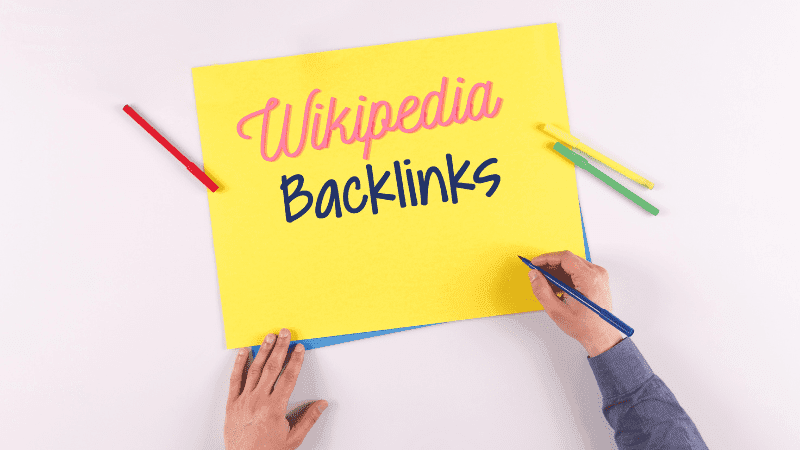
Step 1: Sign Up and Create a Wikipedia Account
The first step in obtaining Wikipedia backlinks is to register a Wikipedia account.
Even though you do not need an account to contribute to Wikipedia pages, having one will help you obtain authority backlinks to your site.
Furthermore, making an account allows you to communicate with other editors via your chat page.
The create account process is easy and will enable you to edit existing content much more easily.
After creating your Wikipedia account and making a few revisions, the platform will allow you to start new articles, modify semi-protected entries, and earn more rights.
The platform will make it easier for you to update long-form extended protected pages the more adjustments you make and the longer your account is active.
If you are lucky, they will invite you in, hoping you will contribute to Wikipedia’s content ecosystem. Still, you can only edit semi-protected pages if the Wikipedia moderators trust you and see your contributions as valuable.
Step 2: Prepare Your Target Keyword Data Set
The second step is simple, and you do not need anyone’s help with it. All you need to do is define your keyword data set.
Keyword research has long been recognized as a solid foundation for any Search engine optimization method.
Determine some broad keywords that will be a starting point on which you can target your Wikipedia backlinks.
For a better increase in your SEO score organically, consider opting for thematically related backlinks.
This will make it easier to get backlinks from Wikipedia in the longer term.
Step 3: Find Wikipedia Link Building Opportunities
Once you have decided on the right keywords, the next step is to look for potential Wikipedia backlinks opportunities.
You can benefit from either fresh or dead links. Dead links refer to when the Wiki page contains hyperlinks to dead URLs that are no longer operational.
When a linked resource disappears, but there is no HTML redirection, the link becomes dead, meaning it needs to be replaced with a new, functional link.
This creates a broken link opportunity that you can take advantage of.
Replacing dead links presents valuable link-building opportunities for any Wikipedia editor planning to build Wikipedia backlinks.
Broken link opportunities give an ideal chance for websites to deliver current material to replace outdated content.
A manual Wikipedia search or a sophisticated search operator can help you find broken links.
This only works if your content is relevant to the dead link opportunities. Still, a dead link opportunity can be one of the most effective Wikipedia backlink opportunities out there and is well worth taking advantage of if you have pages related to the topic on your website.
Regular users often notice dead links on a Wikipedia page quickly. When they find dead links, they will usually add whatever the top Google result is to replace them.
So, if you can get your content well respected by Google already, you can replace dead links organically without needing to do any of the work yourself!
New link opportunities focus on generating a unique link to your material on a Wiki page.
It is significantly easier to obtain fresh backlinks when you are a registered user with a large account history.
Identify keyword-rich locations on Wikipedia articles where you may cite your resource to confirm the accuracy of the material and receive Wikipedia backlinks in the form of a citation link in exchange.
Do some new links first and dead links later so you do not look like a vulture.
But if you spot one broken link that happens to match your website’s existing content related to the page’s topic, then by all means, take advantage of it for your link-building strategy.
Step 4: Create a Relevant Resource
Following identifying Wikipedia backlink potential opportunities, the fourth stage is creating instructional, authoritative, and trustworthy content.
Any link from Wiki pages should take users to a trustworthy website.
Do whatever it takes to develop excellent content for your Wikipedia link-building. That means excellent writing and formatting.
If you want Wikipedia to take you seriously, you must write your original source material hosted on your site, and it has to be good. Producing high-quality source material hosted on your site is imperative to increasing the trust flow score on Wikipedia, thereby establishing credibility and reliability within the community.
Your article must demonstrate exceptional knowledge and authority. It should also be relevant to the topic of the Wikipedia page.
This increases the likelihood of the backlinks passing the Wikipedia manual evaluation and becoming permanent links to your site.
So, it would help if you created related pages with relevant keywords and relevant content. Yes, this is the hard part of the process!
Step 5: Add Backlinks Pointing to Your Material
Whether you are taking advantage of link neglect or adding new links, it is time to put those all-important Wikipedia backlinks into your chosen specific Wikipedia pages.
Make sure you cite your website in the proper style. This increases its chances of becoming a permanent entry on Wikipedia, presenting clickable links to potential visitors.
If you link to your website carelessly without using the required markup language, Wikipedia editors will likely delete it.
When injecting your backlinks, avoid using keyword-rich anchor text.
This sort of keyword stuffing also reduces your chances of obtaining a permanent Wikipedia backlink, as it looks bad to the Wikipedia editors.
Step 6: Wait to See the Results
Wikipedia reviewers review all modifications to Wiki articles. Reviews might take several hours to several days and result in your modifications being approved or denied.
It is denied if an edit is judged improper, spammy, or otherwise violates Wikipedia’s guidelines.
If this occurs, you must modify your link and resubmit it for evaluation—and there is no guarantee that your second version will pass, either!
Although linking to blog articles is better than linking to commercial pages, keep in mind that blogs are often seen as untrustworthy sources.
As a result, links to blog postings may be judged untrustworthy and deleted.
If you can manage it, it is worth trying to link to other pages on your site instead of blog posts (although it is not worth it if all you can do are irrelevant links).
Case study pages or pages that devote their entire article space to research are ideal for this.
In general, the more trustworthy your web resource looks, the more likely a Wikipedia editor will accept it for quality Wikipedia backlinks. Even a single Wikipedia backlink can pay dividends later.
As you plan to enhance your online presence through strategic link building, knowing how to navigate these opportunities effectively can significantly impact your SEO efforts. Let’s explore how you can leverage these strategies to get backlinks from Wikipedia, ensuring your high-quality content gains the visibility it deserves.
Is It Worth It to Buy Wikipedia Backlinks?
Buying backlinks from Wikipedia or any other reputable source goes against ethical SEO practices and can potentially lead to penalties from search engines like Google. Wikipedia strictly prohibits buying and selling backlinks; violating these guidelines can result in your website being banned from Wikipedia or even facing legal consequences.
Additionally, even if you purchase backlinks from Wikipedia through shady means, they are unlikely to benefit your website’s SEO significantly. Google and other search engines prioritize organic, natural backlinks earned through high-quality content and genuine engagement. Backlinks from reputable sources like Wikipedia are valuable because they are typically earned through merit and reflect the authority and credibility of the linked website.
Instead of buying backlinks, focus on creating valuable, informative content that others naturally want to link to. Building relationships with other website owners and influencers in your industry can also help you earn backlinks through collaborations and guest posting opportunities. By prioritizing quality and authenticity, you can build a strong backlink profile that will contribute to long-term SEO success.
Considering these insights, one might wonder how a service like Searcharoo could align with ethical practices in achieving your Wikipedia backlink goals.
Why should you choose Searcharoo for your Wikipedia Backlinks Needs?
Searcharoo could be a suitable choice for your Wikipedia backlinks needs for several reasons:
- Expertise in Wikipedia: Searcharoo likely has experience and expertise in navigating Wikipedia’s guidelines and policies. This is essential for ensuring that your backlinks are added in a manner that complies with Wikipedia’s rules, reducing the risk of them being removed.
- Efficiency: Searcharoo can help you save time and effort by outsourcing the task of creating and maintaining Wikipedia backlinks. This allows you to focus on other aspects of your business or project.
- Quality Backlinks: Searcharoo can help you secure high-quality backlinks from Wikipedia, a reputable and authoritative website. These backlinks can improve your website’s search engine ranking and drive more organic traffic.
- Long-term Benefits: By investing in Wikipedia backlinks through Searcharoo, you’re investing in a long-term SEO strategy. Wikipedia links are typically stable and enduring, providing ongoing benefits for your website’s visibility and credibility.
- Risk Mitigation: Searcharoo’s familiarity with Wikipedia’s guidelines can help mitigate the risk of having your backlinks removed due to non-compliance or spammy practices. This ensures that your efforts yield sustainable results.
- Customized Solutions: Searcharoo may offer costumized solutions to suit your specific needs and goals, providing personalized assistance in optimizing your Wikipedia presence for maximum impact.
Choosing Searcharoo for your Wikipedia backlinks could be a strategic decision to enhance your online presence and drive meaningful traffic to your website.
Summing Up: Leveraging Wikipedia for Effective SEO Link Building
Trying to get backlinks from Wikipedia is well worth your time and effort.
Whether you remove dead links on an old Wikipedia page or add new links to a less well-constructed Wikipedia page, building Wikipedia backlinks can massively boost your search engine rankings.
FAQ
How do Wikipedia Broken Links Work for SEO?
While searching for content possibilities on Wikipedia, you may find a broken or “dead” link.
While this may appear to be an aberration, there is no organization in charge of tracking every link on the site, so a few broken links are just something that inevitably happens.
It is fairly typical for a website to rearrange its content while entirely disregarding its inbound links, which could be one or two links or lead to multiple links “dying.”
In this case, the Wikipedia link will lead to a redirect or nothing.
This natural decline in internet functioning is referred to as “link rot,” the resulting dead links are a terrific opportunity to obtain some pretty low-effort links for your relevant pages.
A dead link is common on the Internet, and you will find dead links on all websites, not just Wiki pages.
A dead link on any web page presents valuable link-building opportunities. Still, a Wikipedia dead link is likely to be replaced faster than any other dead link because Wikipedia’s sole purpose is to be a well-maintained resource.
Is it Worth Building Wikipedia Backlinks?
Getting backlinks from Wikipedia can boost the reliability and traffic to your website.
However, you can only take advantage of these link-building opportunities if you can write a high-quality article that demonstrates your expertise in a subject.
Because the majority of traffic from a Wikipedia backlink is organic, individuals who arrive at your website are likelier to stay than those who get there through search engines.
Do not be put off by the fact that Wikipedia uses nofollow links. A Wikipedia backlink may attract considerable attention to your website.
This is because, in general, only the most trustworthy and authoritative websites are cited on Wikipedia.
Visitors who come to your site through search engines have low expectations.
Visitors directed through Wikipedia, however, already think of your site as an authoritative source!
